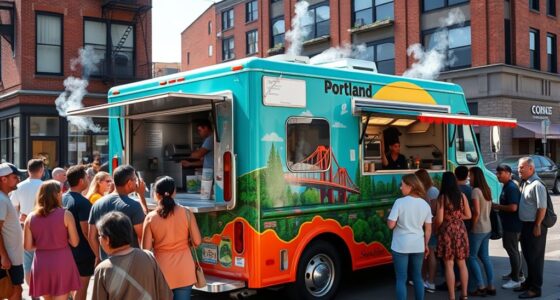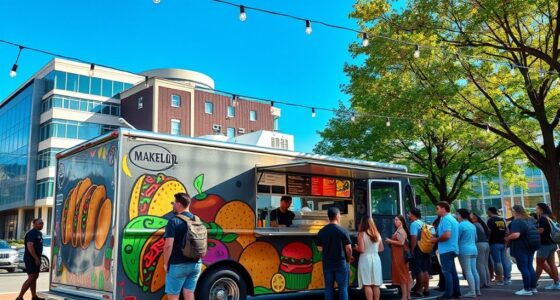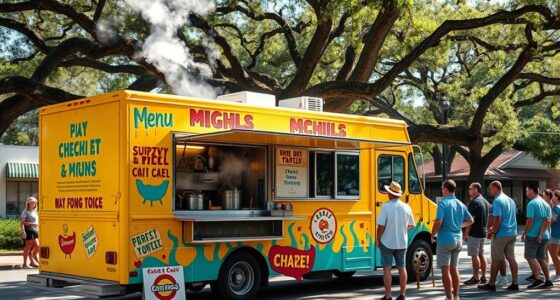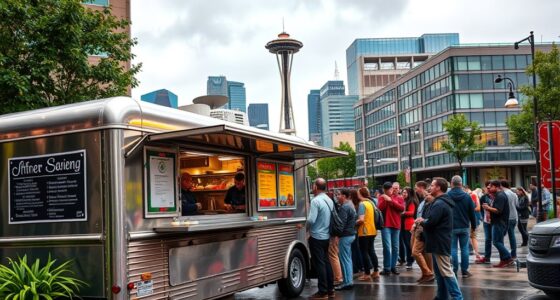To start a food truck in Aurora, IL, you need to understand local regulations, such as permits and inspections, and choose a suitable shared kitchen to meet health standards. You’ll also want to develop a unique brand, plan your menu, and incorporate eco-friendly practices to stand out. Using social media to promote your truck and joining community events can boost visibility. Keep exploring these steps for a successful launch and growth in Aurora’s vibrant food scene.
Key Takeaways
- Obtain necessary permits and licenses from Aurora’s health department and city authorities, including health permits and parking approvals.
- Choose a compliant shared kitchen for food prep and ensure your food truck meets licensing and safety standards.
- Develop a sustainable menu with eco-friendly packaging, considering costs and local Aurora tastes.
- Implement social media marketing strategies on platforms like Instagram and Facebook to build brand awareness locally.
- Secure insurance coverage for your vehicle, liability, and equipment to ensure legal compliance and financial protection.
Starting a Food Truck Business
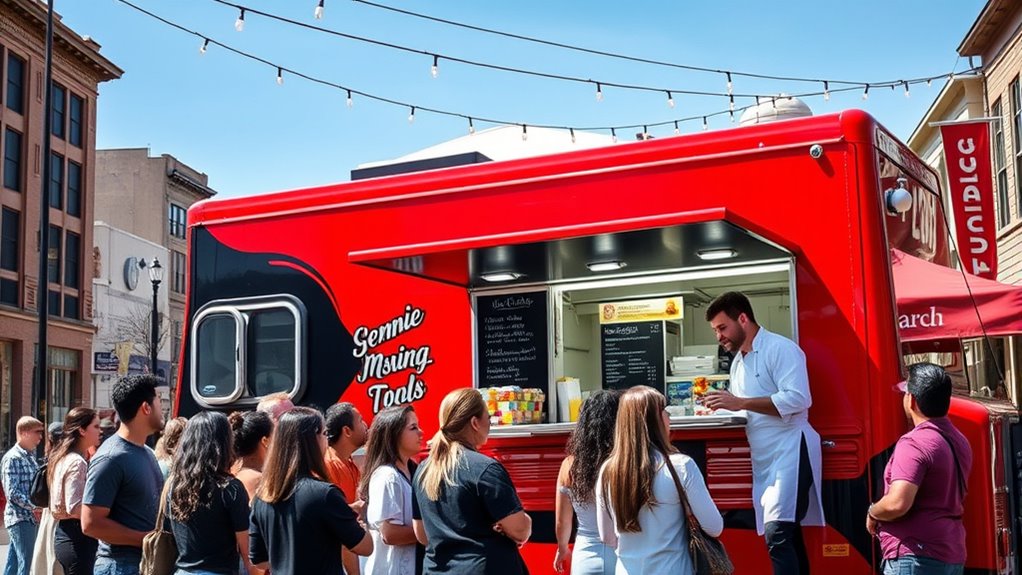
Starting a food truck business requires careful planning and research. You’ll want to focus on sustainable packaging to appeal to eco-conscious customers and reduce waste. Choosing eco-friendly containers shows your commitment to sustainability and can set you apart from competitors. Social media marketing is essential for building your brand and attracting customers in Aurora, IL. Use platforms like Instagram and Facebook to showcase your menu, share behind-the-scenes content, and promote special deals. Consistent posting helps you stay top of mind and grow your local following. Additionally, plan your menu carefully, considering the costs of sustainable packaging and how to highlight your eco-friendly practices. Incorporating environmentally friendly tires and other sustainable materials into your operations can further demonstrate your commitment to eco-consciousness. With strategic marketing and a focus on sustainability, you’ll set a strong foundation for your food truck’s success.
Understanding Local Requirements

To get started, you’ll need to navigate Aurora’s online permit application process, which makes submitting your paperwork straightforward. It’s also important to understand the scheduled inspection timelines and procedures so you can plan accordingly. Additionally, be aware of designated street parking zones to make certain you park legally and avoid fines or disruptions. Knowing local store hours can help you plan your shopping trips efficiently around your food truck schedule.
Online Permit Application Process
Understanding the online permit application process in Aurora, IL, requires you to understand the specific local requirements and follow the city’s digital system carefully. To successfully complete your online permit, you should:
- Gather all necessary documents, including health permits and vehicle registration.
- Review the Aurora online permit portal for specific application steps and fee details.
- Submit your application through the city’s digital system, ensuring all information is accurate and complete.
Scheduled Inspection Timelines and Procedures
Since inspection schedules are essential to launching your food truck smoothly, it’s important to know Aurora’s specific timelines and procedures. Typically, inspections follow a set permit process, and you should expect to schedule them promptly after submitting your application. Aurora’s inspection procedures involve a review of your truck’s health and safety standards, which must be completed before you’re approved to operate.
| Inspection Type | Timeline |
|---|---|
| Initial Inspection | Usually scheduled within 7-10 business days after application submission |
| Follow-up Inspection | As needed, within 3-5 business days if issues arise |
| Final Approval | Granted after successful inspections and permit clearance |
| Re-inspections | Scheduled within 2-3 business days if necessary |
| Routine Checks | Annually, per local regulation |
Designated Street Parking Zones
Aurora designates specific street parking zones where food trucks are permitted to operate, so you must familiarize yourself with these areas before setting up shop. Understanding parking regulations and zone enforcement is vital to avoid fines or disruptions. These zones are clearly marked and vary by location, so check city maps regularly.
To guarantee compliance, consider these key points:
- Verify zone boundaries and operating hours through local signage.
- Follow parking regulations strictly to prevent violations.
- Pay attention to zone enforcement notices and adjust accordingly.
Knowing where you’re allowed to park helps streamline your setup process and prevents issues with city officials. Staying within designated zones is essential for a smooth, legal food truck operation in Aurora.
Setting Up Your Base of Operations
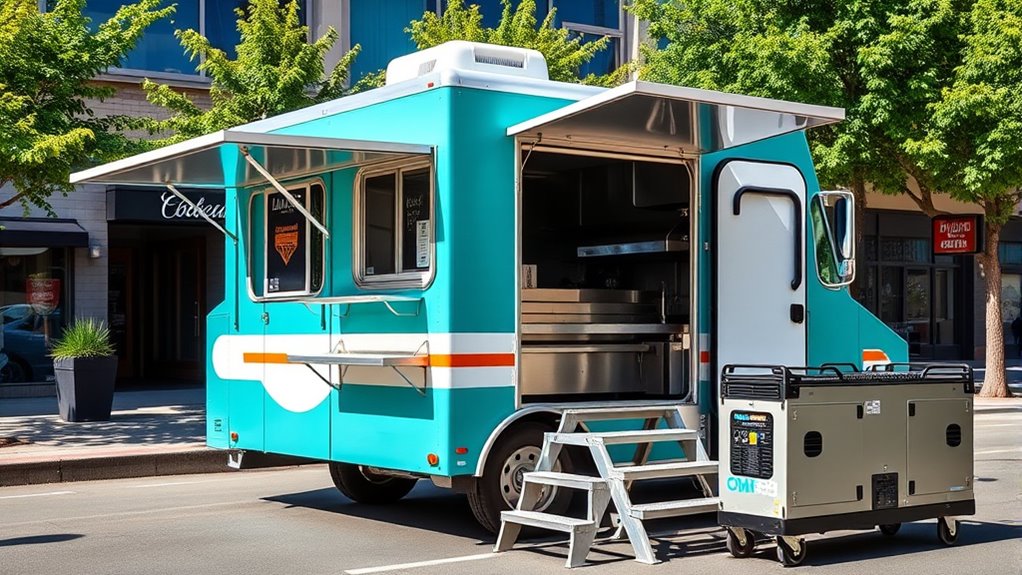
To get your food truck up and running, you’ll need to choose a suitable shared kitchen that meets licensing requirements. Selecting the right custom kitchen equipment is vital to make certain your setup is efficient and compliant. Making these decisions early helps you establish a solid base of operations for your food truck business. Additionally, understanding local health and safety regulations, such as proper digital literacy programs, can help ensure a smooth licensing process.
Shared Kitchen Licensing Requirements
Are you aware of the licensing requirements for shared kitchens in Aurora, IL? To operate legally, you must verify your shared kitchen meets specific licensing requirements. These include obtaining a food service license, passing health inspections, and adhering to food safety standards. You’ll need to submit documentation proving compliance with local health codes and facility standards. Additionally, your shared kitchen must have proper sanitation, pest control, and equipment maintenance protocols.
Key points to consider:
- Secure necessary permits from Aurora’s health department.
- Schedule inspections to verify compliance with food safety regulations.
- Maintain detailed records of cleaning and safety procedures.
Meeting these licensing requirements helps ensure your shared kitchen operates smoothly and legally, paving the way for your food truck’s success.
Custom Kitchen Equipment Selection
Choosing the right custom kitchen equipment is essential for creating an efficient and functional food truck. You need to select equipment that suits your menu and space, focusing on a reliable custom stove setup and refrigeration units selection. Properly designed equipment ensures smooth operations and safety. Take into account compact, multi-functional appliances that maximize space and meet health standards. Here’s a quick guide:
| Equipment Type | Features to Consider | Benefits |
|---|---|---|
| Custom Stove Setup | Size, burners, energy efficiency | Faster cooking, better flow |
| Refrigeration Units Selection | Size, insulation, temperature control | Food safety, freshness preservation |
| Prep Tables | Durability, workspace size | Organization, efficiency |
| Storage Cabinets | Accessibility, security | Clutter-free environment |
| Ventilation Systems | Power, placement, noise level | Safety, air quality |
Budgeting and Financing Your Food Truck
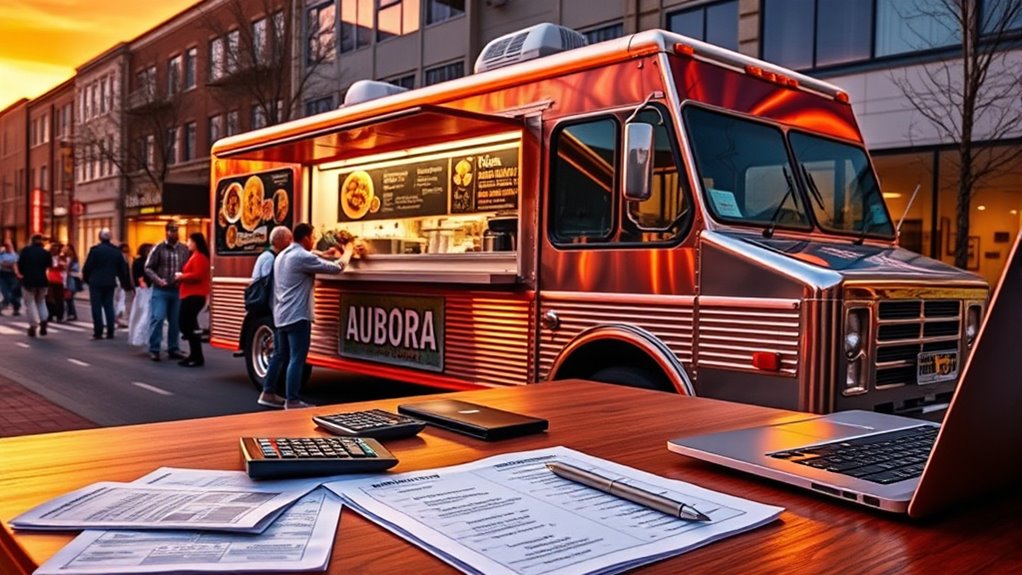
To start your food truck journey, you need to understand your initial costs, like equipment and vehicle setup. Local small business grants can help ease some of those expenses, so it’s worth exploring your options. Additionally, you’ll need to budget for commercial vehicle insurance to stay compliant and protected on the road.
Initial Equipment Investment Costs
Starting your food truck business requires a clear understanding of the initial equipment investment costs, which can vary based on your menu and truck size. To secure initial funding, you’ll need to budget for essential equipment costs upfront. These costs include:
- Commercial kitchen appliances, such as ovens, refrigerators, and fryers
- Cooking utensils, pots, pans, and food prep stations
- Custom truck modifications, including shelving, sinks, and signage
These expenses are vital for running a compliant and efficient operation. Understanding the total equipment costs helps you plan your initial funding accurately. Keep in mind that investing in quality equipment can reduce maintenance costs later. Proper budgeting ensures you’re prepared for the upfront costs that come with launching your food truck.
Local Small Business Grants
Securing funding for your food truck can be more manageable when you explore local small business grants available in Aurora, IL. These grants can help cover costs related to food truck branding, such as signage, logo design, and promotional materials. Applying for grants often requires demonstrating your business’s community impact and growth potential. Additionally, effective social media marketing plays a pivotal role in building your brand presence and attracting customers without overspending. Many local programs prioritize promising entrepreneurs who leverage innovative marketing strategies. Keep in mind that grants can be competitive, so prepare a solid business plan and showcase how your food truck will serve Aurora’s community. With the right funding sources, you’ll be better positioned to launch your food truck successfully.
Commercial Vehicle Insurance Requirements
Understanding the commercial vehicle insurance requirements is essential for budgeting and financing your food truck. Proper coverage safeguards your investment and ensures compliance with local laws. When selecting insurance, consider these factors:
- Coverage for fuel efficiency to keep costs manageable and protect against unforeseen expenses.
- Vehicle maintenance coverage to cover repairs and keep your truck running smoothly, reducing downtime.
- Liability protection to shield you from potential claims that could threaten your business’s financial stability.
Designing Your Menu and Pricing Strategy

To create a menu that appeals to local customers, you need to tailor your dishes to their tastes. Calculating ingredient costs accurately helps you set prices that cover expenses and attract patrons. Focusing on these points guarantees your menu is both appealing and profitable. Additionally, incorporating multi-functional menu items can optimize your food truck’s limited space and offer variety to your customers.
Customizing Dishes for Local Palate
Designing your menu and pricing strategy begins with tailoring dishes to meet the tastes and preferences of Aurora’s local community. To stand out, consider blending fusion cuisine that combines familiar flavors with unique twists. Focus on flavor profiles that resonate locally, such as incorporating regional spices or ingredients. Here are steps to customize effectively:
- Research popular local dishes and identify flavor combinations that appeal to Aurora’s residents.
- Experiment with fusion cuisine, merging different culinary traditions to create innovative options.
- Adjust portion sizes and prices based on local spending habits and competitive analysis.
Ingredient Cost Calculations
Calculating ingredient costs accurately is essential for setting a profitable menu and competitive prices. Proper cost estimation helps you maintain ingredient affordability while ensuring sufficient profit margins. To do this effectively, break down each dish’s ingredients and track their expenses. Use the following table to organize your cost estimation:
| Ingredient | Cost per Serving |
|---|---|
| Protein | $2.50 |
| Vegetables | $1.00 |
| Spices & Sauces | $0.50 |
Technology and Operations

Using wireless card readers for mobile payments makes transactions quick and convenient for your customers. Real-time stock tracking software helps you stay on top of inventory levels and reduce waste. Incorporating these technologies can streamline your operations and improve overall efficiency. Additionally, leveraging Net+ Certification Benefits can enhance your understanding of secure payment systems and network security to protect your business.
Wireless Card Readers for Mobile Payments
Wireless card readers have become essential tools for food truck operators who want to accept mobile payments quickly and securely. They enable seamless wireless payments, making mobile transactions faster and more convenient for your customers. When choosing a device, consider these key factors:
- Compatibility with your smartphone or tablet, ensuring smooth integration.
- Security features like encryption and tokenization to protect customer data.
- Transaction speed to keep lines moving during busy hours.
Real-Time Stock Tracking Software
Implementing real-time stock tracking software is essential for keeping your food truck operations efficient and organized, especially during busy service hours. With this technology, you can monitor inventory management closely, ensuring you never run out of key ingredients or overstock items. It helps streamline your supply chain by providing instant updates on stock levels, so you can reorder proactively. This minimizes waste and reduces delays caused by shortages. By integrating real-time stock data, you gain better control over your inventory flow, which boosts overall efficiency. Additionally, you can identify usage patterns and adjust purchasing habits accordingly. Ultimately, this software keeps your food truck running smoothly, saving you time, money, and stress during your busiest shifts.
Marketing and Growing Your Presence
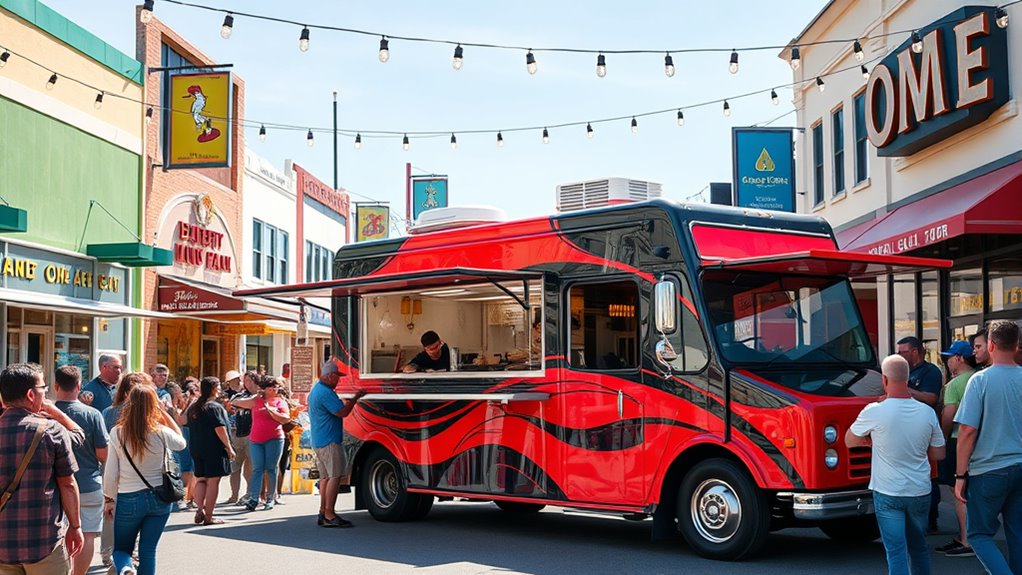
To grow your food truck’s presence, focus on targeting high-traffic event spots where crowds already gather. Engage with local foodie groups and online communities to spread the word and build a loyal following. These strategies help you attract more customers and establish your brand in Aurora.
Identifying High-Traffic Event Spots
Finding the right spots for your food truck is essential to attracting a steady flow of customers. High-traffic event spots can markedly boost your visibility and sales. To identify these locations, consider these factors:
- Attend local festivals, farmers’ markets, and community events where foot traffic peaks.
- Partner with event organizers and build vendor relationships to secure prime spots.
- Scout areas with reliable access to food truck maintenance services, ensuring smooth operations during busy times.
Engaging Local Foodie Groups
Connecting with local foodie groups is a powerful way to boost your food truck’s visibility and build a loyal customer base. These groups are full of passionate food lovers enthusiastic to discover new tastes, making them ideal partners for community engagement. Attend meetups, share your menu, and invite members to your truck for special tasting events. Engage actively on social media platforms where these groups gather, posting updates and responding to feedback. Collaborating with local foodie groups creates word-of-mouth buzz and positions you as a favorite in Aurora’s vibrant food scene. By fostering genuine relationships with community members and food enthusiasts, you’ll grow your presence naturally and authentically, turning casual customers into loyal supporters.
Best Practices for Aurora Success

Understanding the unique dynamics of Aurora’s food scene is essential for your truck’s success. To stand out, focus on strong food truck branding that resonates with local tastes and values. Use social media marketing to build a loyal customer base by sharing behind-the-scenes content, daily specials, and customer shout-outs. Consider these best practices:
Stand out in Aurora with strong branding, social media engagement, and local partnerships.
- Develop a memorable logo and consistent branding that appeals to Aurora’s community vibe.
- Engage actively on social media platforms, posting regularly to promote events and new menu items.
- Partner with local events and markets to increase visibility and foster relationships within Aurora’s bustling food scene.
Frequently Asked Questions
What Permits Are Unique to Aurora’s Food Truck Regulations?
Aurora requires you to obtain specific permits, including Aurora permits and local licensing, to operate your food truck legally. You must pass a health inspection through the Aurora Health Department and secure a mobile food vendor license. Additionally, you’ll need to adhere to Aurora’s parking restrictions and zoning regulations. Make sure to stay updated on any city-specific ordinances to guarantee your food truck complies with all local requirements.
How Does Aurora’s Weather Impact Food Truck Operation Hours?
Think of Aurora’s weather as a fickle river shaping your journey. You should plan your seasonal operations around weather considerations, knowing harsh winters may freeze your schedule, while summer heat can boost sales or cause equipment issues. Adjust your hours accordingly, staying flexible with weather forecasts. By doing so, you guarantee your food truck remains a welcoming oasis regardless of Aurora’s climate, maximizing your success year-round.
Are There Specific Local Events to Target in Aurora?
You should target local festival partnerships and seasonal event planning in Aurora to boost your food truck’s visibility. Attend popular events like the Aurora Farmers Market and Aurora Blues Festival, which attract large crowds. Connecting with organizers early allows you to secure prime spots. By aligning your schedule with seasonal festivals, you’ll increase sales and build a loyal customer base. Don’t miss out on these key opportunities to grow your business.
What Are Aurora’s Noise Restrictions for Food Trucks?
Think of Aurora’s noise restrictions as a delicate dance you must follow. You’re allowed to operate within specific sound limits, especially during quiet hours. Sound ordinances typically restrict noise levels to ensure community peace, usually around 65-70 decibels, and may vary by zone or time of day. To avoid fines, always verify with local authorities or the Aurora city code for precise noise ordinances, and keep your music and generators in check.
How Can I Connect With Aurora’s Food Truck Community?
You can connect with Aurora’s food truck community by joining local food festivals and participating actively. Follow social media groups dedicated to Aurora’s food scene, where vendors share updates, tips, and event info. Attend gatherings and network with fellow food truck owners. Engaging online and offline helps you build relationships, gain visibility, and stay informed about opportunities to grow your business in Aurora’s vibrant food community.
Conclusion
Starting your food truck in Aurora might seem simple, but don’t be fooled—behind every tasty meal is a maze of permits, budgets, and marketing. Ironically, the more you prepare, the more it feels like a roller coaster. Yet, with persistence and a dash of creativity, you’ll serve up success that’s as satisfying as your signature dish. So, gear up, stay flexible, and remember: the real flavor lies in overcoming every twist on your journey.


